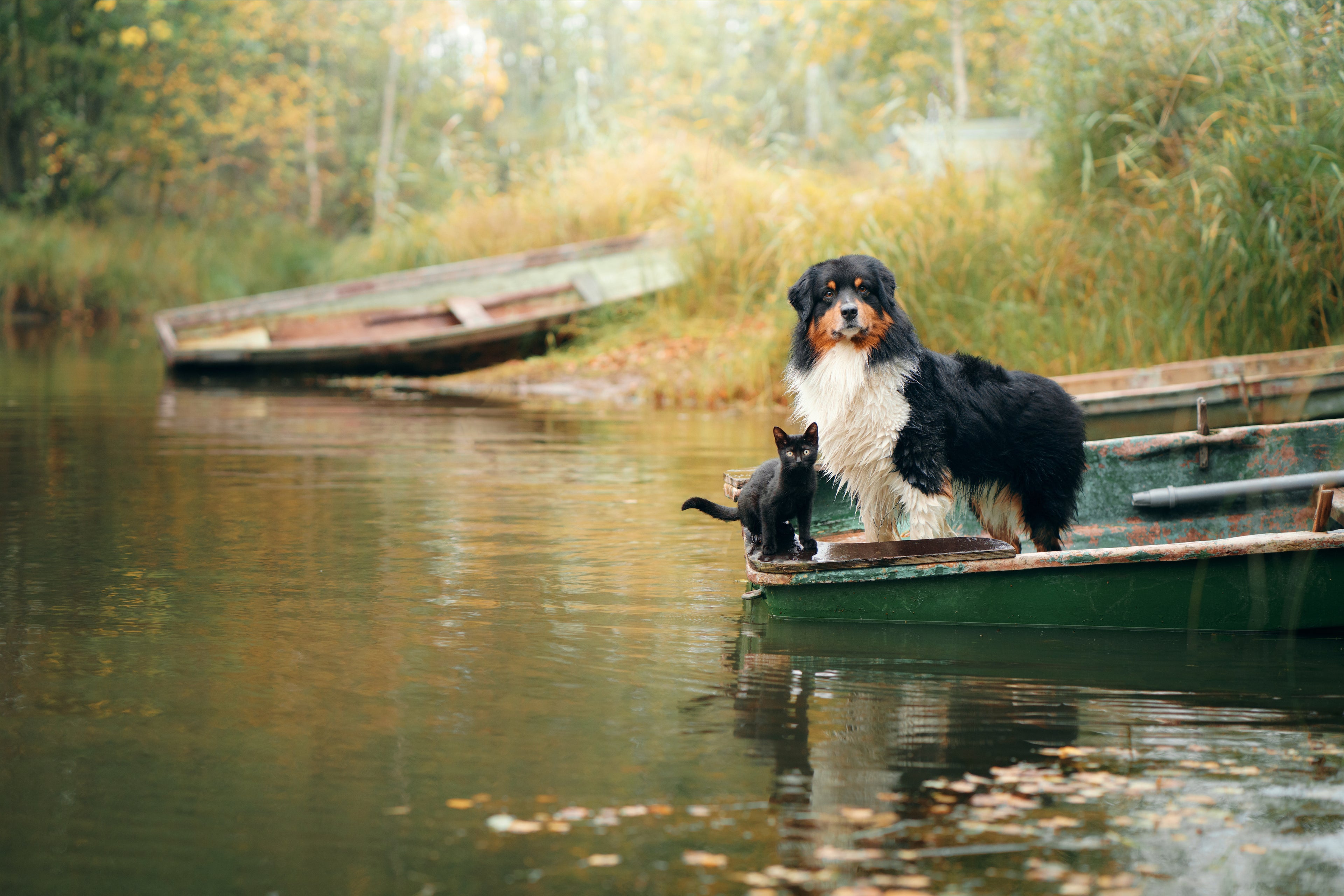You walk into your home and a little bundle of joy with adoring eyes and a wagging tail greets you full of boundless enthusiasm! How amazing does that sound?
Bringing a new puppy into your home is an exciting time, but it also comes with a lot of responsibility. As a new puppy parent, it’s key to create a safe and secure environment for your companion to ensure they receive the best care possible.
In this puppy care guide, we have lots of useful insights and advice for first-time puppy owners, including tips on topics such as nutrition, supplements, toys, and more! Caring for a puppy can be challenging so we hope that our puppy care guide helps you and your new pup to be ready to embark on your journey of daily wellness and lifelong happiness.
How to Puppy-Proof Your Home
Creating a safe environment for your new puppy is crucial to their well-being, so puppy-proofing your home is key to ensuring their safety. Just like you would ‘baby-proof’ your home for a child, you should also learn how to ‘puppy-proof’ your home for your four-legged friend.
Puppies are naturally curious and love to explore their surroundings, especially with their mouths. We recommend that you take care to remove or safely secure any potentially hazardous items like electric wires, toxic plants (such as ivy, poinsettia, tulips, daffodils, and more!), and any small objects that could be swallowed.
Create a Designated Rest Area
Set up a comfortable crate or bed where your puppy can rest. This will become their safe space and should be placed in a quiet area of your home where they can settle naturally.
If you choose to use a crate for your puppy, we have a couple of tips to help you on your journey. When introducing your puppy to the crate, allow them to venture in and sniff around at their own pace. You can make the experience a pleasant one by giving positive reinforcement and puppy training treats to reward them for going inside the crate. Remember that patience is key!
An important piece of advice for first-time puppy owners using a crate is, for safety reasons, to ensure that you always remove your puppy’s collar before leaving them in a crate. Removing it eliminates the risk of the tag getting caught and potentially creating a choking hazard.
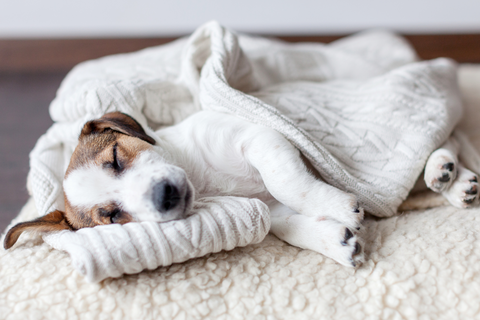
Provide Toys & Mental Stimulation for Puppies
Puppies are bundles of energy flying around, so they need plenty of mental and physical stimulation to keep them entertained and prevent destructive behaviour. Studies have shown that licking releases endorphins in animals’ brains that make them feel calmer and more relaxed (Pet MD).
One of our favourite ways to provide mental stimulation for puppies is by putting natural peanut butter on a lick mat for dogs (even better if it’s frozen!). The effort of sniffing and getting the peanut butter out is a great mental workout. You may notice that it tires them out even more than a long walk!
When it comes to toys, we suggest opting for those that are appropriate for their age and size. Soft plush toys are perfect for comfort, whilst rubber or rope toys can satisfy their teething urges.
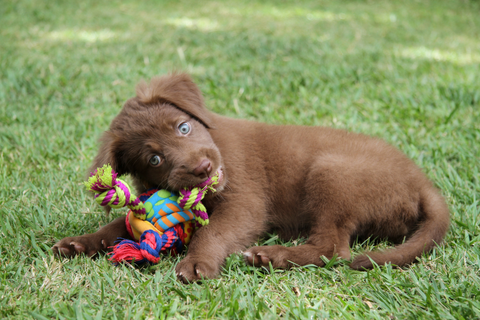
Feeding Your Puppy
Proper nutrition is essential for the growth and development of your puppy, so it’s good to find what works for you and your new canine companion early on.
When looking for high-quality puppy food, check that it is formulated to meet the nutritional needs of a growing dog. It should contain protein, fat, carbohydrates, calcium, phosphorous, and amino acids, whilst being easily digestible. Every puppy is different, so if you’re ever in doubt, always contact your vet or a pet nutritionist to discuss your puppy’s individual needs and find the best food for them.
Creating and following a feeding schedule can help a puppy, as they require smaller, more frequent meals throughout the day. This will also help avoid overeating as portions can be monitored and controlled.
Don’t forget to make sure that they always have access to fresh, clean water!
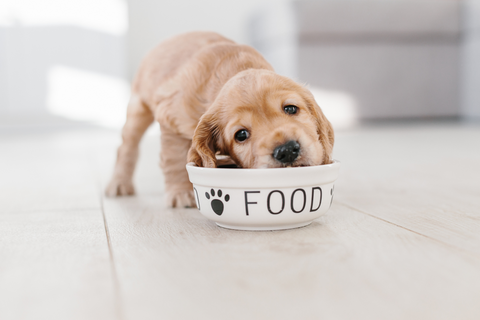
Common Types of Puppy Supplements
Dog supplements are additional nutritional components that can help bridge the gap between what your pet gets from their regular diet, and what they might need for optimal health. Whilst balanced and high-quality puppy food should be the foundation of your pup’s diet, certain puppy supplements can address specific needs and concerns.
Joint Supplements: 80% of senior dogs suffer from arthritis, which is why it’s important to take preventive action. As your puppy grows, their joints develop too. Dog joint supplements can aid in joint health and prevent potential issues like hip dysplasia, especially in larger breeds prone to joint problems.
Omega-3 Fatty Acids
Renowned for their benefits in promoting healthy skin and a shiny coat, omega-3 fatty acids also support cognitive development in dogs. Omega-3s are often found in fish oil supplements, such as Natural Scottish Salmon Oil, and can contribute to your puppy’s overall vitality.
Probiotics and Digestive Enzymes
A healthy digestive system is crucial for your puppy’s nutrient absorption. Dog probiotics can promote a balanced gut microbiome, whilst digestive enzymes can aid in breaking down food and improving nutrient utilisation.
If you are ever in doubt about what supplements to use, consult your veterinarian.
Exercising Your Puppy
Puppies need ample exercise to burn off their energy and maintain a healthy weight. Engage in age-appropriate activities to avoid straining their developing joints. Short walks (around 15 minutes), playtime in a secure garden, and controlled indoor games are all great options.
As 8 out of 10 dogs exhibit arthritis-like symptoms before the age of two, it’s important to take their joint health seriously from an early age.
Socialisation is equally vital. Expose your puppy to various people, animals, and environments to help them become well-adjusted adults. Puppy classes or playdates can be fantastic for this purpose.
Socialisation isn’t just about whether they can socialise well with other dogs or people; it’s also about your puppy being able to be in an environment where they can just do nothing. By taking them out in public, sitting on a bench, and doing nothing, you show them that they don’t need to react to everything around them.
Training Your Puppy
As you embark on your puppy training journey, remember that patience is your best friend. Training your puppy takes time, effort, and consistency. Focus on positive reinforcement techniques to encourage good behaviour, rewarding them with praise, toys, or natural dog treats.
Basic commands like “sit”, “stay” and “come” lay the foundation for a well-behaved adult dog. Use short, consistent cues and keep training sessions short and frequent for optimal results.
Regular Vet Visits & Grooming
Routine veterinary visits are a must to keep your puppy’s health in check. Your vet will monitor your puppy’s growth, administer vaccinations, and provide guidance on any health concerns.
Grooming is also an essential part of puppy care, especially if they are a breed with longer hair. Investing in high-quality dog grooming products and carrying out regular brushing, nail trimming, and ear cleaning will help your puppy become accustomed to grooming routines early on.
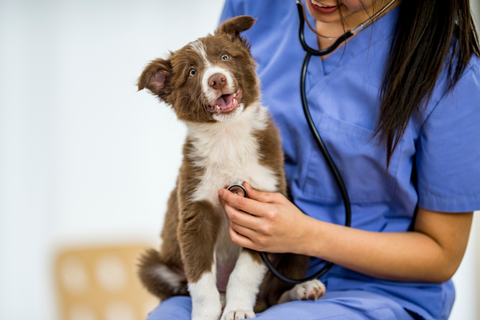
In conclusion, welcoming a puppy into your life is a delightful adventure filled with unconditional love and unforgettable moments. By creating a safe nurturing environment, providing proper nutrition, offering engaging toys, and ensuring an appropriate level of exercise, you’re laying the groundwork for a happy and healthy life together.
Remember, each puppy is unique, so adapt this puppy care guide to suit your pup’s specific needs. Enjoy this journey of discovery, growth, and companionship as you watch your adorable puppy blossom into a beloved adult dog.
Contact Us
For further helpful advice and guidance on how to keep your puppy feeling happy and healthy from the inside out, visit our pet advice blog or contact us with any questions. Our friendly customer care team will be happy to help.


